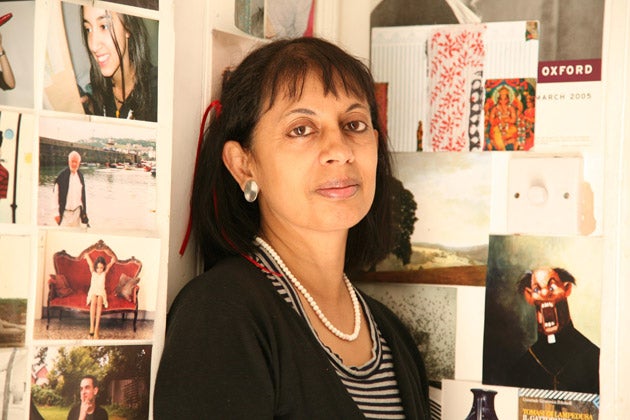Roma Tearne: 'The success of serious novelists from the subcontinent makes it good to be an Asian writing in Britain'

Your support helps us to tell the story
From reproductive rights to climate change to Big Tech, The Independent is on the ground when the story is developing. Whether it's investigating the financials of Elon Musk's pro-Trump PAC or producing our latest documentary, 'The A Word', which shines a light on the American women fighting for reproductive rights, we know how important it is to parse out the facts from the messaging.
At such a critical moment in US history, we need reporters on the ground. Your donation allows us to keep sending journalists to speak to both sides of the story.
The Independent is trusted by Americans across the entire political spectrum. And unlike many other quality news outlets, we choose not to lock Americans out of our reporting and analysis with paywalls. We believe quality journalism should be available to everyone, paid for by those who can afford it.
Your support makes all the difference.The day before I left Sri Lanka, I went down to the beach at Mount Lavinia. There are three rocks close to the sand and, using a penknife, I carved my name on one of them. Roma Chrysostom, Colombo, Ceylon, Asia. The World. The Universe. I was a 10-year-old half-Tamil, half-Sinhalese girl on her way to the UK. What followed was not what I expected. Britain in the Sixties was not a place that had much patience with a girl like me living with my family in a depressed part of London. Long before I took my A-levels in English, I was aware that survival depended on the need to integrate into the life of my host country. So out went the Asian accent, the memories of frangipani, and all desire to wear a sari.
Even when I was in Sri Lanka, I had been an avid reader. I knew The Wind in the Willows long before I saw a willow tree. In Brixton, the discovery of the public library was like coming across a treasure trove, and I read everything I could lay my hands on. Slowly, as my teenage years progressed, I read my way through every 19th-century novel I could find, with a list dominated by Jane Austen, George Eliot, and Thomas Hardy. Then I moved on to the French and the Russians, falling in love with Madame Bovary before empathising with Anna Karenina. Of Asian literature I knew nothing. When my father suggested tentatively that I try V S Naipaul, I shook my head, reluctant to revisit ideas of loss and memory.
With no role model or sympathy for the Asian migrant experience, and with a desperation to belong, I had no desire to play what I had heard called "the race card". One incident in particular confirmed that this was the best policy. At university, where I had gone to read English, I handed in an essay on Bleak House, only to be asked by my tutor who had written it for me. If you can write like this, he said, you would not be here. You would be at Oxford.
Giving up my emergent desire to become a writer, I did go to Oxford much later, but not to read English. Instead, I studied fine art. My paintings at this time were large, white abstracts. Why, asked my artist friends, did I use no colour? Why, when I had such a rich, exotic background, did I not tap it? The word "exotic" made me wince. It was, for me, merely a different word for "the other". I did not want to be "the other".
Picking my way through Eighties Britain, it would be years before I saw a change. Here and there, in the area of darkness in which I lived, bringing up my mixed-race children, I noticed a few lights rising like fireflies. It wasn't, however, a writer I noticed first, but the artist Anish Kapoor. But soon after, I began to find the writers. Rushdie, of course, and my favourite, Vikram Seth, whom I read and re-read. When Arundhati Roy won the Booker, I was overjoyed. And then there were others – Anita Desai, Narinder Dhami, Monica Ali, to name but a few. At a conference recently, a young Asian novelist announced that in this time of globalisation, he felt free to write about any place in the world. Memory and loss, the hardship of integration, these were all things of the past, he told me triumphantly. While I did not agree with him (the past and its memory shapes all our futures and will not simply go away), how wonderful it is that such a conversation can take place.
As I move into the writing of my fourth novel, I no longer feel that the issue of "playing the race card" is pertinent. Problems of race are as great as ever, but thanks to the sudden flurry of serious Asian novelists – many of whom are women – it could not be a better time to be an Asian writing in Britain. And best of all is the extraordinary, informed audience that this has in turn produced.
Roma Tearne's third novel, 'Brixton Beach', was published by HarperCollins in June
Join our commenting forum
Join thought-provoking conversations, follow other Independent readers and see their replies
Comments